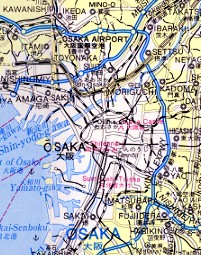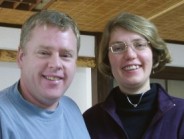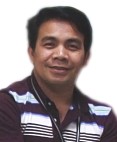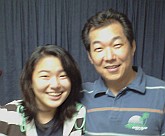
|
||
There are a variety of aspects to our church model that may be different from the norm, but we haven't lost our marbles - there are reasons (and a lot of prayer) behind each new idea. The basic idea of a cell church is not new, but perhaps it is not yet widely understood - see What is a Cell Church to understand the cell church baseline idea we are starting with. Most cell churches in other countries meet in homes of members. However, in Japan that may not be practical in a lot of cases. First of all, Japanese homes are often very small, due to 127 million people plus all their farms and infrastructure trying to fit into the non-mountainous 15% or so of an island country the size of Montana. Second (and perhaps related to the first reason), it is not a common part of Japanese culture to entertain in one's home - most people invite their friends to a coffee shop or restaurant, not their home. There may indeed be church members with the space and desire to host a cell, but we can't depend on that. Instead, there are lots of other alternatives. Our initial idea was to have some cells in community centers, perhaps some in the back rooms of restaurants, and in small apartments that are leased for the purpose of allowing several cells to use it at different times during the week. We may still get a chance to do some of that, but we have discovered that those locations are also difficult. Many community centers won't allow religious meetings, and the ones that do often are hard to book reliably on a weekly basis. And realtors won't show us apartments when they know we will do church meetings that involve singing (might disturb the neighbors). But they will show us office spaces, which are more expensive than apartments but have the freedom to do what we want. Our current meetings are all held in one such locations (see Sekime Chapel) and for four years we had a second place as well (see Abeno Room). But ultimately we hope to model a variety of meeting locations, so that people who join the church can see different ways that they themselves might be able to start new cells. Also, a distinctive of a busy, densely populated city like Osaka is that the typical idea of having a church serve the neighborhood around it begins to lose its meaning, because everyone seems to be going all over town all the time - to work, to school, shopping, clubs, etc. Rather than a "neighborhood church", we imagine this church as more of a "commuter church", with the cells located convenient to transportation hubs so that people can get to them on their way to or from something else that they normally do anyway, and with enough choices of times that there will be one that fits their schedule. Another way that our idea may be different than many churches is that we don't plan on having a Sunday morning worship service, especially one that has the appearance of being the "main" worship for the church. In most Western cultures, Christianity has been a basis for a lot of how the society operates, so it is not difficult or socially unacceptable to commit one's Sunday mornings to attending church. But Japan is different. Six-day work weeks are still very common, so for some workers, Sunday is the only day they can spend time with their family. Also, many school events happen only on Sunday mornings, like sports games, PTA meetings, etc. Neighborhood meetings are most typically scheduled on Sunday morning, as are neighborhood cleanup days, when everyone in the neighborhood pitches in to clean up parks, pick up litter, etc. So when a Japanese person becomes a Christian, especially if they are the first believer in their family, insisting on going to church every Sunday morning may cause resentment by their family, by the school, and by their neighbors, because they can no longer participate in those important society functions. But if they can find a different time during the week to worship with fellow believers, they can continue to participate in those Sunday activities and have an opportunity to use the relationships they have formed in those activities to be able to witness to the people they know. Yet another distinctive has come from studying the "post-modern" culture emerging in the U.S., and noting the similarities with the underlying culture of the Japanese. As one long-time missionary to Japan has put it, "Japan has always been post-modern." Most missionaries in Japan personally come from a "modern" cultural worldview, which sees truth as an important value, perhaps the most important, and considers personal convictions more important than group belonging. But post-modern thinking considers the group more important than the individual, and values belonging to a group more important than standing up for an abstract truth. Most of our churches, planted under "modern" thinking, have a paradigm of "believe to belong", where a person comes to faith, and then is welcomed as a member of a local body. We want to have more of a "belong to believe" paradigm, where a person is first accepted as part of a group, and as they learn more about the Gospel and experience Christian fellowship, they move toward belief, perhaps with others in the group who also started out as unbelievers. After the initial starting phase of our cell church, in which we started a few cells directly as worship cells designed for believers, we want most cells to be started not as worship cells but as Bible studies or other gatherings for interested non-believers. As time goes on, we will encourage those groups to move along a path toward becoming a fully-functioning worship cell as the group is ready (probably when a significant portion of the members have become believers). That way, people who start out as seekers at a Bible study and then become Christians do not have to leave the group of people they have become attached to and start attending a worship service with strangers (often also at a different time and place, which may not be convenient for them); instead their friends can watch them grow in their new faith, and the hope is that eventually the group itself will become a worship service and the members not only believers, but mature disciples. We are also working on developing a monthly gathering of all the cells, sometimes with some sort of special event like a concert or showing of a movie as well as a worship time and teaching. As it grows we may be able to provide different "tracks", like a seminar, for people at different maturity levels or with different interests, regardless of which cell they attend. The degree of bonding of groups in Japan will also affect the method we will encourage for multiplying cells. The standard cell church model used in other cultures calls for splitting a cell in two, but we think that will be too painful for a group of Japanese. Instead we want to encourage a mature cell to "send out" one to three people who are ready to start a new cell, and if the new cell meets at a different time from the original one, they can continue attending the original for a while if they want, for continuity and encouragement as they move into leadership. Naturally we will also provide leadership training for them, and for those who don't feel confident enough to teach in their cells, we plan to provide a variety of teaching series' on DVD (see DVD Resource Project). Hopefully with the low cost of places to meet, teaching resources available, and encouragement from their cell and the church as a whole, many lay people will be able to look at what's needed to start a new cell and say, "I could do that!" While "worship cells" would have Bible teaching from their lay leader or DVDs, the content would be different in "seeker cells". One course we are currently using as a baseline course for seekers (and discipleship for new believers who haven't had much grounding) is The Alpha Course, which teaches the foundations of faith through videos and group discussion. Our first several Alpha groups were primarily believers from OIC, but as of about 2005 OIC's own Alpha ministry is off the ground, so attendees of Grapevine Cell Church's Alphas are typically seekers, and we have baptised two new believers as of 2005, both of whom came to faith through Alpha. As we expand, we hope some of the graduates will lead new groups themselves, and Alpha groups would stay together to form cells. As we observe how the Alpha Course is received, we may decide that we need a "pre-Alpha" that covers things that are assumed to be common understanding in western cultures but are new concepts for most Japanese, and/or materials to follow after Alpha if the group is not yet ready to study the Bible in the way that a Christian group would - a "Beta Course", so to speak. Please pray with us that the Lord would show us what He wants us to use with which kinds of groups. We mentioned cell groups and celebration gatherings, but there will be a third leg to the stool. Eventually we would like to start publishing a monthly newsletter that will be mailed directly to every member, both believers and seekers. It will be a way to announce new groups starting, so that people can invite friends, and also be an avenue to get some baseline teaching into the hands of everyone, to guard against a cell leader going astray. We hope that the three-legged stool of the cell groups to nurture, celebration gatherings to unify, and newsletter to inform, will be a solid structure to support evangelism, discipleship, and leadership building. First Steps The big milestone that we crossed in December 2002 was finally settling on a church name. The church is called Budou No Ki Seru Chaachi, or in English, Grapevine Cell Church. Naturally our theme verse is John 15:5 (see the left sidebar under the menu). Although only Christians would understand the full meaning of the name, Japanese in general love nature, and when we asked the opinion of several Japanese friends, they all thought the grapevine had a more positive imagery that other ideas we had. There is a regular Japanese word for "church" - kyoukai - but the characters that are used to write kyoukai indicate a meaning of a "teaching meeting", and we wanted to get away from the already strong idea that becoming a Christian is an academic venture of studying to get enough knowledge. So at the suggestion of a Japanese friend we chose the Japanese pronunciation of the English word church, which is commonly known but doesn't carry the idea of study as much. After choosing the name, we designed a logo (see the top of this page) and reserved a domain name and space for a church web site (of course it's in Japanese, but you are welcome to look - www.budounoki.org). Next we looked for and found our first "full-time" location, which we call Sekime Chapel. Then we had our dedication service on May 11, 2003, and at the same time began two worship cells and a prayer meeting. Then we hosted many short-term workers and held a variety of events. We designed two full-color tri-fold brochures introducing the church: 30,000 copies of one featuring our summer events (which the short-termers distributed in various ways), and 15,000 of a more generic version, which we are still distributing gradually. To read more about our 2003 short-term activities, see the May, June, July/August, and September 2003 issues of Osaka Direct.
In December 2003 we signed the lease on our second facility, called Abeno Room. It was not only home to a meeting that alternated between Alpha and other Bible studies, but was used by other Christians involved in church planting. For a while Aaron DeLeon had a Bible study there with an aim toward starting a Calvary Chapel in Osaka, and while that plan is currently on hold, Sakai Chinese Church had been using it for Bible studies and other events as they minister to Chinese students in the area, and a Bible study for deaf Japanese led by another missionary had also been meeting there. Abeno Room is close to Osaka Christian College, where we are working on developing an ongoing ministry. Due to lack of resources we had to let go of its lease in March 2008, but if ministry picks up in the future and another fulltime facility is needed, we'll do that again somewhere, as the Lord leads.
|
| This site is maintained very simply by - please write with any comments. | ||||


 In August 2003, another MUP missionary named Aukje moved here from the Tokyo area (Fujisawa city, to be precise) to help us with this effort. She had been looking for ways to use her gift and interest in leading small group Bible studies, so a cell church is a perfect fit for her. She chose an apartment very near Sekime Chapel, and in addition to leading Alpha discussion groups, a semi-monthly Beta study, and our prayer meeting, she is keeping the church books (the hardest part of which has been learning how to make a complex Japanese accounting software conform to our situation), keeps Sekime Chapel ready for various events, and teaches English for her own source of income as well as for developing contacts for evanglism and the church. Then in April 2005 she married Will Dykstra, and he is gradually doing more ministry in Japanese as his language skills improve.
In August 2003, another MUP missionary named Aukje moved here from the Tokyo area (Fujisawa city, to be precise) to help us with this effort. She had been looking for ways to use her gift and interest in leading small group Bible studies, so a cell church is a perfect fit for her. She chose an apartment very near Sekime Chapel, and in addition to leading Alpha discussion groups, a semi-monthly Beta study, and our prayer meeting, she is keeping the church books (the hardest part of which has been learning how to make a complex Japanese accounting software conform to our situation), keeps Sekime Chapel ready for various events, and teaches English for her own source of income as well as for developing contacts for evanglism and the church. Then in April 2005 she married Will Dykstra, and he is gradually doing more ministry in Japanese as his language skills improve. In 2008, Aukje and Will decided to go home to Canada, but at about the same time, the Lord led two other workers to us. Joselito Rabina is a Filipino pastor who was doing mission work in another part of Japan but needed to change, and we decided he would be a good fit for us, so in July 2008 he moved into the Sekime facility temporarily, and began various ministries. Right now his Japanese language skills are not strong enough to lead groups in Japanese, but he is studying, and in the meantime has begun a vibrant ministry to Filipinos in the area. Sunchol Song is a Korean man whose parents are longterm missionaries in Japan, but after spending his high school years here Sungchol moved to the U.S., married and started a family, and was an assistant pastor at a church there.
In 2008, Aukje and Will decided to go home to Canada, but at about the same time, the Lord led two other workers to us. Joselito Rabina is a Filipino pastor who was doing mission work in another part of Japan but needed to change, and we decided he would be a good fit for us, so in July 2008 he moved into the Sekime facility temporarily, and began various ministries. Right now his Japanese language skills are not strong enough to lead groups in Japanese, but he is studying, and in the meantime has begun a vibrant ministry to Filipinos in the area. Sunchol Song is a Korean man whose parents are longterm missionaries in Japan, but after spending his high school years here Sungchol moved to the U.S., married and started a family, and was an assistant pastor at a church there.  But now his parents are elderly and hospitalized, which brought him back to Japan. And as he says, "Wherever I happen to be, I do outreach." (A philosophy that all Christians should have, right?) So we helped him with his visa to stay here, and his daughter also is staying with him and going to a local international Christian school. (His wife and son are still in the U.S. as the whole family seeks the Lord's will for their longer term future.) Since he is fluent in Japanese and English, he leads cell groups, Japanese Bible studies, and a new concept called "English Bible Cafe". Praise the Lord for bringing us Jose and Sungchol!
But now his parents are elderly and hospitalized, which brought him back to Japan. And as he says, "Wherever I happen to be, I do outreach." (A philosophy that all Christians should have, right?) So we helped him with his visa to stay here, and his daughter also is staying with him and going to a local international Christian school. (His wife and son are still in the U.S. as the whole family seeks the Lord's will for their longer term future.) Since he is fluent in Japanese and English, he leads cell groups, Japanese Bible studies, and a new concept called "English Bible Cafe". Praise the Lord for bringing us Jose and Sungchol!